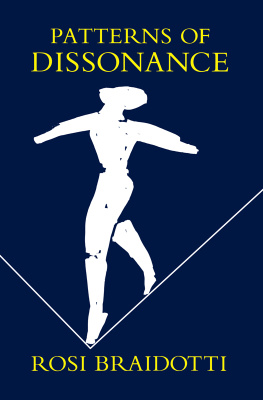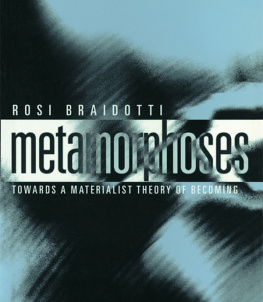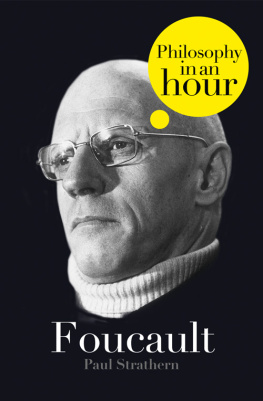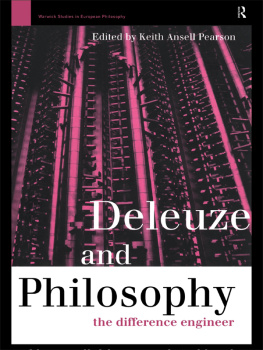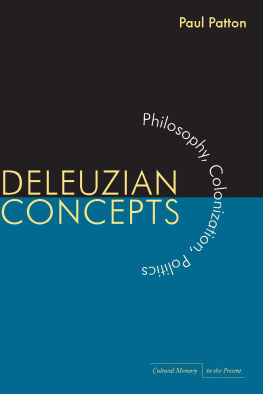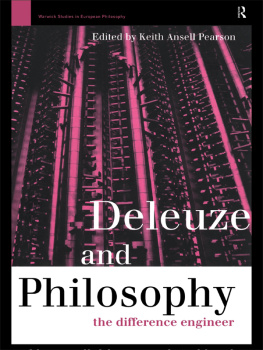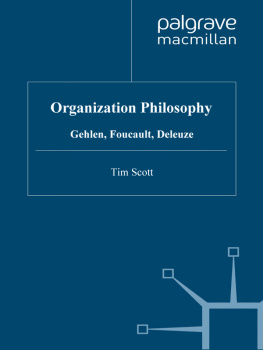Patterns of Dissonance
A study of women in contemporary philosophy
Rosi Braidotti
Translated by Elizabeth Guild
Polity Press
Copyright Rosi Braidotti 1991; copyright this translation Polity Press 1991
First published 1991 by Polity Press in association with Blackwell Publishers Ltd.
Reprinted 1996
Editorial office:
Polity Press, 65 Bridge Street,
Cambridge CB2 1UR, UK
Marketing and production:
Blackwell Publishers Ltd
108 Cowley Road, Oxford OX4 1JF, UK
All rights reserved. Except for the quotation of short passages for the purposes of criticism and review, no part of this publication may be reproduced, stored in a retrieval system, or transmitted, in any form or by any means, electronic, mechanical, photocopying, recording or otherwise, without the prior permission of the publisher.
Except in the United States of America, this book is sold subject to the condition that it shall not, by way of trade or otherwise, be lent, re-sold, hired out, or otherwise circulated without the publishers prior consent in any form of binding or cover other than that in which it is published and without a similar condition including this condition being imposed on the subsequent purchaser.
ISBN 978-0-7456-6572-6 (Multi-user eBook)
A CIP catalogue record for this book is available from the British Library.
Typeset in 10 on 11 Palatino
by Wearside Tradespools, Fulwell, Sunderland
Printed in Great Britain by
Athenaeum Press Ltd, Gateshead, Tyne & Wear
Contents
Acknowledgements
Patterns of Dissonance owes so much to so many friends and colleagues, that I cannot thank them all here. Special gratitude goes to the friends with whom I studied in Paris: Meaghan Morris, Paul Patton and David Wills. Of great importance were two feminist study groups I was involved in while writing my Ph.D. in Paris: in the first instance Alice Jardine, Anna Gibbs and Jane Weinstock, who were later joined by Claire Duchen, Nancy Huston, Danielle Haase-Dubosc and Naomi Schor. I owe warm-hearted thanks in particular to Alice Jardine whose book Gynesis intertwines with my own, each echoing the other, in a way unique to collective feminist research and writing.
I am very grateful to my teachers and professors: Jenny Lloyd, Hlne Vedrine and Michelle Perrot. I wish to dedicate a fond thought to the president of my Ph.D. panel, Franois Chtelet, now deceased. The grants commissions should also be remembered: all my thanks to the Australian National University in Canberra, who sponsored both my undergraduate and my postgraduate training through several scholarships. To the French Foreign Affairs Scholarship Office in Paris that granted me four years of much-needed financial assistance. To the International Federation of University Women in Geneva, who awarded me the Winifred Cullis Grant for one year.
I am indebted to my translator Liz Guild, who tamed the French prose in which this book was originally written and helped me with sound editorial advice.
I have been particularly inspired by the women of the Paris-based feminist journal Histoires dElles (197780) and in particular to Oristelle Bonis, Nancy Huston, Do Pujebet and Leila Sebbar. My thanks also to all those who participated in the Franco-Belgian journal Les Cahiers du Grif, in its fifteen years of glorious history, and especially to Franoise Collin, the founding member. To the magazine Noi Donne in Rome, and particularly Anna Maria Crispino. To the friends of Womens Studies International Forum; to Elizabeth Weed and Naomi Schor, who started Differences and to Alice Jardine, Brian Massumi, Heidi Gelpi and Bob Small for Copyright.
Special thanks to Romano Onori, Catharine K. Stimpson, Geoff Wiseman, Torild Skard, Danielle Haase-Dubosc, Nancy K. Miller and Luce Irigaray, for setting the example. Acknowledgements are also due to many generations of students, both undergraduate and postgraduate, for their enthusiasm, their criticism, their open-mindedness. I owe special thanks to my research assistants at the University of Utrecht, for their generosity and patience.
All my thanks to my sister Giovanna, and to my brother Augusto: they are the oldest friends I have.
To my friends scattered all over the world, especially to Wendy Spinks, Janice Gothard, Penny Richards, Helen Szaday, Maurita Harney, Sally Duncan-Taylor, Katy Hamilton-Baillie, Emma Simonin, Morag Shiach. I am especially indebted to Oristelle Bonis, who helped with the early drafts of the text, to Anne-Marie Dardigna, who support never failed; to Teresa Brennan who helped me conclude and to Anneke Smelik who read through the last version, with great care. And to Rita Moatti, of(f) course.
For Bruna and Mario
That is where I disagree with the philosophers. They talk about passionate things but there is no passion in them. Never talk happiness with a philosopher.
Jeanette Winterson, The Passion
Because they are human and not gods, I now and then strike a bargain with philosophers. Philosophers cannot promise you anything. You cannot make a deal with them; but betrayal is not within their power either.
Miriam Guensberg, Foto Josef
1
Images of the Void
It is no longer possible to think in our day other than in the void left by mans disappearance. For this void does not create a deficiency; it does not constitute a lacuna that must be filled. It is nothing more, and nothing less, than the unfolding of a space in which it is once more possible to think. Foucault
For over a century now, philosophical modernity has been aware of fundamental problems in the nature, function, and limits of human subjectivity. Special attention has been paid to the critique of the classical representations of the subject, as exemplified in seventeenth-century rationalism. This vision of subjectivity has become as much a contested object as the Enlightenment project of the historical progress of humanity through the adequate use of reason. Anti-Cartesianism has therefore been put on the agenda of modernity: it raises questions concerning the structure of subjectivity in such a way as to challenge dualism, of which the Cartesian body-and-soul dichotomy is the paradigm, and in so doing to change the very definition of the function of philosophy.
The contemporary theoretical climate, at least in Continental and especially French philosophy is dominated by the discourse of the crisis, meaning the questioning of subjectivity and rationality.
The object of this study is the intersection of philosophical modernity, defined as the discourse of the crisis of the rational subject, and the question of the feminine and of women in philosophy. Bordering this territory are, on the one hand, analyses of the state of contemporary philosophy by such philosophers as Michel Foucault or Gilles Deleuze; and on the other, the research into theory, politics, and subjectivity pursued by a growing number of women working in the field of philosophy.
DIAGNOSING THE CRISIS
According to Foucault, our age, as a whole, is trying to escape from the heritage of classical rationalism.
We are all epistemological orphans, and the ontological insecurity we suffer is our unavoidable historical condition. Afflicted by the melancholy which henceforth sadly trying to find her place in the new cynicism of postmodern society. As a famous graffito on the Paris walls put it: God is dead, Marx is dead, and Im not feeling too well myself.
The French school of philosophical modernity builds upon and works through the issue of the crisis of rationality and, contrary to the German critical tradition, focuses on the decline of reason as the ideal and the appropriate definition of human subjectivity. At times, this approach drifts into a critical, nihilistic mode, but it never ceases to bring the discourse of the crisis to bear upon the issue of changing notions of subjectivity.

